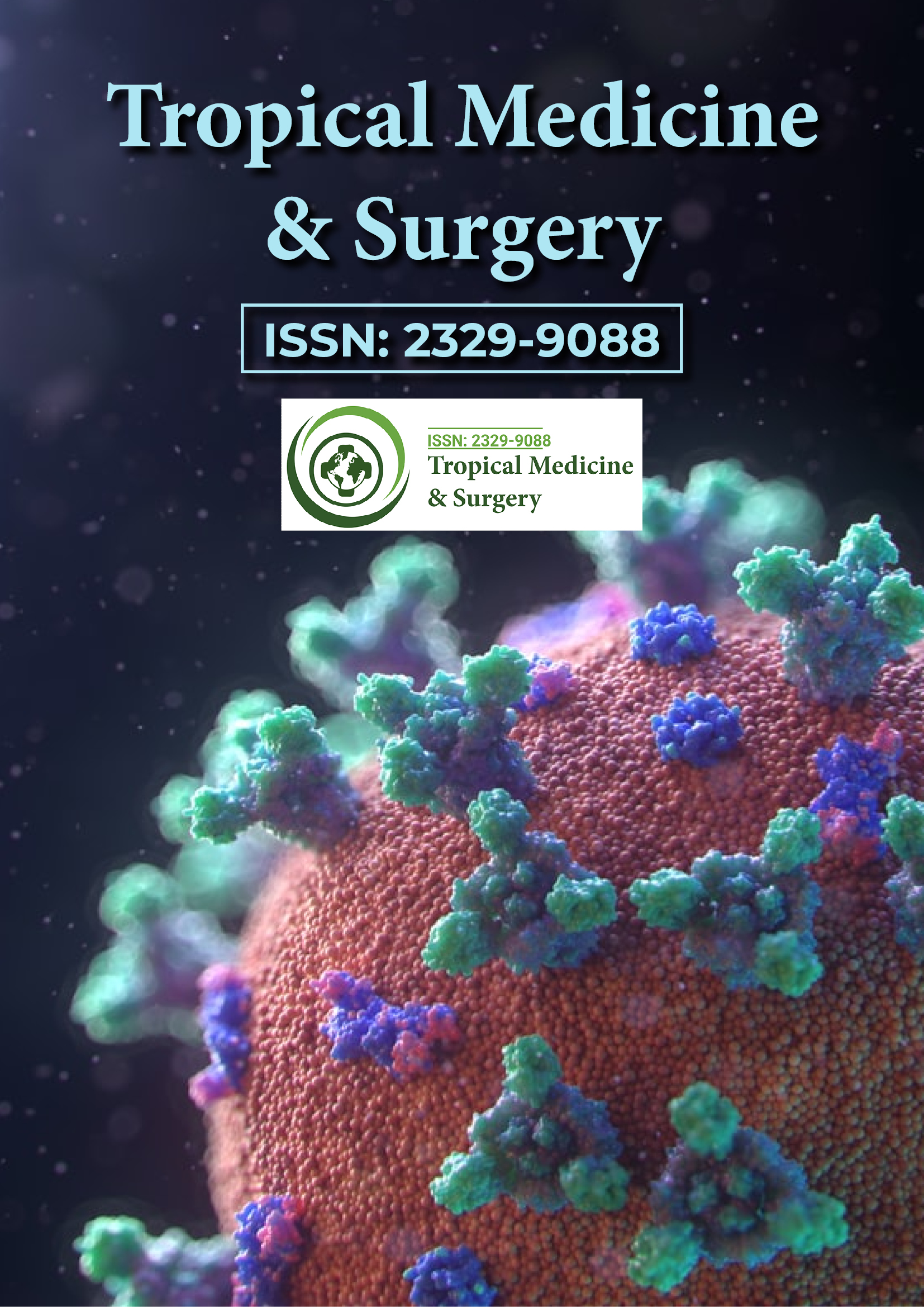Indexed In
- Open J Gate
- Academic Keys
- RefSeek
- Hamdard University
- EBSCO A-Z
- OCLC- WorldCat
- Publons
- Euro Pub
- Google Scholar
Useful Links
Share This Page
Journal Flyer

Open Access Journals
- Agri and Aquaculture
- Biochemistry
- Bioinformatics & Systems Biology
- Business & Management
- Chemistry
- Clinical Sciences
- Engineering
- Food & Nutrition
- General Science
- Genetics & Molecular Biology
- Immunology & Microbiology
- Medical Sciences
- Neuroscience & Psychology
- Nursing & Health Care
- Pharmaceutical Sciences
Perspective - (2024) Volume 12, Issue 1
Tropical Mycobacterial Infections: Surgery, Medicine and Public Health
Herman Kremer*Received: 01-Jan-2024, Manuscript No. TPMS-24-24591; Editor assigned: 05-Jan-2024, Pre QC No. TPMS-24-24591 (PQ); Reviewed: 19-Jan-2024, QC No. TPMS-24-24591; Revised: 26-Jan-2024, Manuscript No. TPMS-24-24591 (R); Published: 02-Feb-2024, DOI: 10.35248/2329-9088.24.12.344
Description
Tuberculosis (TB) a respiratory infection caused by various strains of the Mycobacterium tuberculosis complex, has long been a global health concern. In tropical regions, the impact of TB is particularly pronounced, with unique challenges arising from the prevalence of tropical mycobacteria. The Mycobacterium genus encompasses a diverse group of bacteria, with several species capable of causing tuberculosis in humans. While Mycobacterium tuberculosis is the most TB cases globally, tropical regions are characterized by the presence of additional mycobacterial species, collectively referred to as Non- Tuberculosis Mycobacteria (NTM) or environmental mycobacteria.
Tropical mycobacteria include a wide array of species, such as Mycobacterium Avium Complex (MAC), Mycobacterium kansasii, Mycobacterium fortuitum, and Mycobacterium abscessus. These species can cause a spectrum of diseases, including pulmonary infections, skin and soft tissue infections, and disseminated diseases. Unlike Mycobacterium tuberculosis, which primarily spreads from person to person, tropical mycobacteria often have environmental reservoirs. Water, soil, and biofilms on various surfaces serve as habitats for these bacteria, and individuals can be exposed through contact with contaminated sources. Tropical mycobacterial infections can present with clinical symptoms that mimic tuberculosis caused by Mycobacterium tuberculosis. This clinical mimicry can complicate diagnosis, leading to challenges in differentiating between TB and NTM infections based solely on clinical presentation. Some tropical mycobacteria, including certain strains of M. abscessus, are known for their resistance to multiple antibiotics. This resistance poses challenges in treatment, requiring a tailored approach and careful consideration of antimicrobial susceptibility patterns. Pulmonary infections caused by tropical mycobacteria may necessitate surgical interventions, such as pulmonary resection. Removal of affected lung tissue is considered in cases of localized disease, persistent infections, or complications that do not respond adequately to medical treatment. Skin and soft tissue infections caused by tropical mycobacteria may require surgical debridement and drainage. This is particularly relevant in cases of abscess formation, chronic ulcers, or infections that do not respond to conventional antibiotic therapy. Tropical mycobacteria can cause infections in joints and bones, leading to conditions such as osteomyelitis and septic arthritis. Surgical interventions, including debridement, joint aspiration, and, in severe cases, joint or bone resection, may be necessary to control the infection and preserve joint function.
Matrix-Assisted Laser Desorption/Ionization Time-of-Flight Mass Spectrometry (MALDI-TOF MS) has emerged as a powerful tool for the rapid and accurate identification of mycobacteria. This technology allows for the precise profiling of bacterial proteins, facilitating the differentiation of closely related species and aiding in the timely initiation of appropriate treatment. Determining the antimicrobial susceptibility of tropical mycobacteria is essential for guiding effective treatment. Advances in automated systems and standardized testing methods have improved the accuracy and speed of antimicrobial susceptibility testing enabling clinicians to antibiotic regimens based on individual susceptibility profiles. The presence of tropical mycobacteria poses challenges for TB control programs, as these bacteria can complicate the diagnosis and treatment of TB. Distinguishing between infections caused by Mycobacterium tuberculosis and tropical mycobacteria is essential for implementing appropriate and effective public health measures. Improved diagnostic techniques and increased awareness have led to the increased recognition and reporting of tropical mycobacterial infections. This recognition is essential for understanding the true burden of these infections, developing targeted interventions, and refining public health strategies. Efforts are necessary to better understand the epidemiology, clinical manifestations, and treatment outcomes of tropical mycobacterial infections. These insights contribute to the development of evidence-based guidelines and inform public health policies. The challenges of antibiotic resistance among tropical mycobacteria, global antimicrobial stewardship efforts are crucial. Strategies to optimize the use of antimicrobials, prevent the emergence of resistance, and preserve the efficacy of existing antibiotics are essential components of global TB control.
Building healthcare capacity particularly in tropical regions with a high burden of mycobacterial infections. This involves training healthcare professionals, enhancing diagnostic capabilities, and improving access to surgical and medical interventions. Community engagement and education play a pivotal role in TB control, including tropical mycobacterial infections. Raising awareness about the diverse manifestations of mycobacterial diseases, promoting early diagnosis, and encouraging adherence to treatment regimens contribute to improved outcomes. Tropical mycobacteria, with their diverse species and unique characteristics, significantly impact the landscape of tuberculosis in surgery and medicine. The challenges posed by these mycobacteria necessitate a nuanced and multidisciplinary approach to diagnosis, treatment, and public health interventions. As the global health community continues to navigate the complexities of mycobacterial infections in tropical regions, collaborative efforts and targeted strategies are to effectively combating the diverse array of mycobacteria contributing to the global burden of tuberculosis.
Citation: Kremer H (2024) Tropical Mycobacterial Infections: Surgery, Medicine and Public Health. Trop Med Surg. 12:344.
Copyright: © 2024 Kremer H. This is an open access article distributed under the terms of the Creative Commons Attribution License, which permits unrestricted use, distribution, and reproduction in any medium, provided the original author and source are credited.
